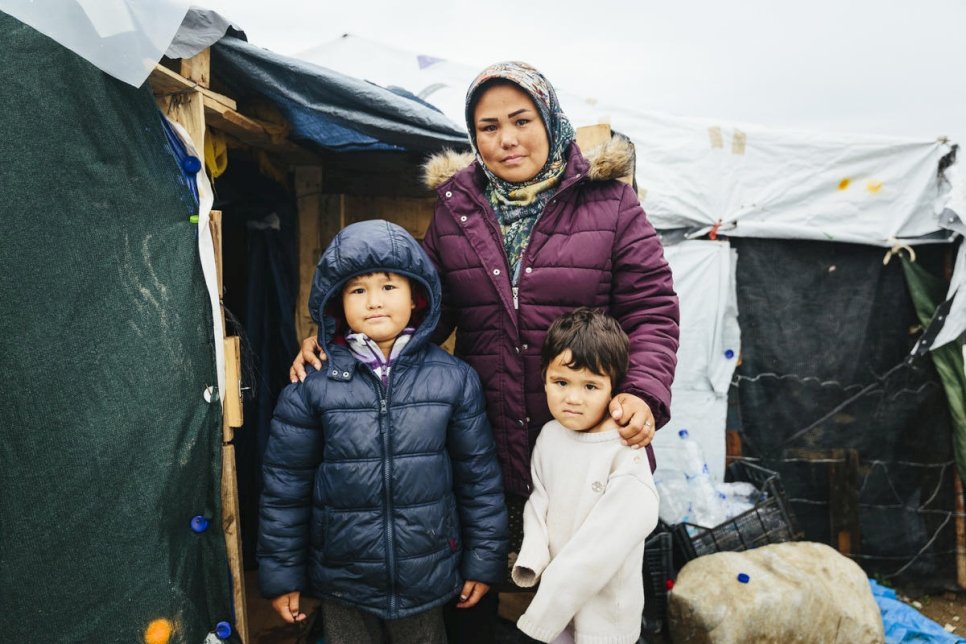Ελληνικά BRUSSELS – As the world continues to combat COVID-19, UNHCR, the UN Refugee Agency, is calling on the German Presidency of the European Union (EU) to keep refugee protection high on the agenda. UNHCR is proposing concrete ways the EU can ensure a bold and robust response to forced […]

An Afghan asylum-seeker and her two children stand outside their makeshift shelter adjacent to the Moria Reception and Identification centre on the Greek island of Lesvos, November 2019.
BRUSSELS – As the world continues to combat COVID-19, UNHCR, the UN Refugee Agency, is calling on the German Presidency of the European Union (EU) to keep refugee protection high on the agenda. UNHCR is proposing concrete ways the EU can ensure a bold and robust response to forced displacement during the pandemic as well as long term. The envisaged EU Pact on Migration and Asylum also provides an opportunity for the EU to better protect forcibly displaced people in Europe and abroad, and support host countries.
”The virus knows no borders and impacts everyone but certain populations, including forcibly displaced people, are at heightened risk,” said Gonzalo Vargas Llosa, UNHCR’s Representative for EU Affairs. “Through both political and financial support, the EU can help to manage a global crisis and better protect refugees.”
The virus can only be tackled when everyone is protected. This also means upholding international standards and laws during the pandemic, and drawing on lessons to ensure a long-term responsive and responsible EU approach to migration and asylum.
UNHCR is calling on the EU to continue to preserve access to asylum even during these challenging times. Fair and fast asylum procedures to quickly determine who needs international protection and who does not, in line with legal safeguards, and an effective solidarity mechanism with EU Member States receiving a disproportionate number of asylum claims would support a workable and sustainable asylum system. Now is the time to shift the EU’s response to disembarking and relocating people rescued at sea to a predictable mechanism – saving lives and protecting people must be at the heart of all responses.
While UNHCR understands the challenges posed by the COVID-19 pandemic, good practices across the EU demonstrate that public health can be protected while ensuring access to territory and asylum, including through quarantines and health checks. UNHCR has compiled such good practices and issued them together with further practical recommendations to States. Strengthening national asylum systems and procedures as well as ensuring access to solutions, including through resettlement, is more important than ever.
“At a time when globally and in the EU, we are all grappling with uncertainty and change, access to fundamental rights, including asylum, must remain a constant,” said Vargas Llosa. “We’ve seen that protection even during a pandemic is possible, and the positive solutions the EU has already presented should set the course for its long-term response to forced displacement.”
With 85 per cent of the world’s refugees in developing countries where health systems are already overwhelmed and under-capacitated, further and flexible funding (development as well as humanitarian) is also needed to support host countries and displaced people. Development and cooperation aid are key, so refugees are included in national systems (with access to healthcare, education etc) and safety nets. This is necessary to limit the socio-economic impact of COVID-19 and for refugees to thrive not just survive.
UNHCR remains ready to support the German Presidency, the EU and Member States to enhance solidarity with refugees and the countries hosting them in the EU and globally, during the pandemic and beyond. The COVID-19 crisis demands a coherent, effective, and global response that leaves no-one behind.
For further information, please see:
Or please contact:
Μοιράσου το στο Facebook Μοιράσου το στο Twitter